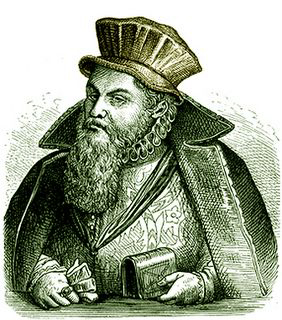Philipp Nicodemus Frischlin facts for kids
Philipp Nicodemus Frischlin (also spelled Nikodemus) was a very talented German scholar who lived from 1547 to 1590. He was many things at once: a philologist (someone who studies language and literature), a poet, a playwright (who writes plays), a mathematician, and even an astronomer (who studies stars and planets). He was born in a place called Erzingen, which is now part of Balingen in Württemberg. His father was a minister there.
Contents
Frischlin's Early Life and Achievements
Nicodemus Frischlin studied at the famous university of Tübingen, specifically at the "Tübinger Stift" which was a special school for scholars. In 1568, he became a professor there, teaching poetry and history. He was very good at writing plays. In 1575, he wrote a comedy called Rebecca. He performed this play for emperor Maximilian II in Regensburg. The emperor was so impressed that he gave Frischlin a special award called the laureateship. Later, in 1577, he was given an even higher honor: he was made an imperial count palatine (Comes palatinus Caesareus). This was a fancy title that meant he was a special official of the emperor.
Challenges and Travels
In 1582, Frischlin had to leave Tübingen because of some disagreements. He took a job teaching in Laibach, which is now Ljubljana in Slovenia. He stayed there for about two years. When he returned to the university in 1584, he faced some legal challenges. Because of these difficulties, he moved to Frankfurt am Main in 1587.
For about a year and a half, he taught at a school in Braunschweig. He also spent time in other cities like Strasbourg, Marburg, and Mainz. In March 1590, while in Mainz, he faced more legal trouble and was arrested. He was held in the fortress of Hohenurach, near Reutlingen. Sadly, on November 29, 1590, he died while trying to escape from his prison cell.
Frischlin's Creative Works
Frischlin was a very creative and busy writer. He produced many different types of works, showing he was talented both as a poet and a scholar. He wrote many poems in Latin, often trying to write like the famous ancient Roman poets. His comedies were lively and fresh. He also wrote important notes and translations for classical works, especially for the poems Georgics and Bucolics by Virgil. Even though these works are not as well-known today, they were very important for scholars in his time. His collected poems, called Opera poetica, were published many times between 1535 and 1636.
Some of his most famous works include:
- the Hebraeis (1590): This was a long Latin poem based on the history of the Jewish people from the Bible.
- the Elegiaca (1601): This was a collection of his lyric poetry, which are poems that express feelings. It had twenty-two books!
- the Opera scenica (1604): This collection included six comedies and two tragedies. One of his comedies was Julius Caesar redivivus, which he finished in 1584.
- the Grammatica Latina (1585): This was a Latin grammar book.
- He also translated works by famous ancient Greek writers like Callimachus and Aristophanes.
- He wrote helpful notes and explanations for the works of Persius and Virgil.
Literature
- D. F. Strauß, "Leben und Schriften des Dichters und Philologen Nicodemus Frischlin", 1856.
- S. Holtz, D. Mertens (Hsg.), "Nicodemus Frischlin (1547 - 1590), poetische und prosaische Praxis unter den Bedingungen des konfessionellen Zeitalters", Stuttgart, Bad Cannstatt 1999.
- Gustav Bebermeyer: Nicodemus Frischlin. In: Neue Deutsche Biographie (NDB). Bd. 5, S. 620
 | Tommie Smith |
 | Simone Manuel |
 | Shani Davis |
 | Simone Biles |
 | Alice Coachman |


